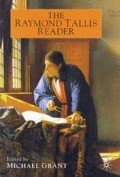Abstract
In this reading, taken from Newton’s Sleep (1995), Tallis takes up the theme of the response of intellectuals to science. He begins from the fact of pain. There is a connection that he detects between the attitude of certain intellectuals to suffering and the attitude cultivated by the Church. There is, however, little spiritual content in unrelieved toothache. Death from neonatal tetany — in which the baby spends its first and only week of life convulsing to death — is even less compelling as an example of the spiritual benefits to be obtained from physical suffering. He cites a remark of C.P. Snow’s, one of those who, as Tallis sees it, understood the issues at stake here, to the effect that the ‘tragic’ sense of life opens a moral trap. It is all too easy to believe that, because human life is tragic, it does not matter if two-thirds of the world are starving to death. Pursuing his theme in relation to AIDS, Tallis notes that Susan Sontag, a ‘leading intellectual’ if ever there was one, has questioned the whole idea of a disease characterised by immune failure and has tried to suggest that AIDS is ‘really’ a ‘product of definition and construction’. Scientists, on the other hand, have worked out the mechanism of the virus and developed treatments and strategies which may in time lead to a vaccine. The problem that certain humanists have with science is that, while it has dramatically diminished human helplessness before the non-human universe, it seems to have done so at the cost of diminishing our communion with the vital forces of nature. Tallis challenges this assumption, which emerged with the Romantics and continues to enjoy a wide following today.
Access this chapter
Tax calculation will be finalised at checkout
Purchases are for personal use only
Preview
Unable to display preview. Download preview PDF.
Notes
Martin Seymour-Smith, Guide to Modern World Literature (London: Hodder & Stoughton, 1974), p. xviii.
Peter Medawar, The Hope of Progress (London: Methuen, 1972).
J. Chin, in ‘Current and future dimensions of the HIV/AIDS pandemic in women and children’, Lancet, 336, 1990, pp. 221–4.
G.C. Schild and E.J. Stott, ‘Where are we now with vaccines against AIDS?’, British Medical Journal, 306, 1993, pp. 947–8.
Rainer Friedrich’s critique of the postmodernists: ‘The Deconstructed Self in Artaud and Brecht’, Forum for Modern Language Studies, xxvi, 1990, pp. 282–95.
George Steiner, Real Presences (London: Faber & Faber, 1989).
Lewis Wolpert, in The Unnatural Nature of Science (London: Faber & Faber, 1992, p. 43).
See J.R. von Salis, Rainer Maria Rilke: The Years in Switzerland, translated by N.K. Cruickshank (London: The Hogarth Press, 1964).
See, for example, Rupert Sheldrake, The Rebirth of Nature: New Science and the Revival of Animism (London: Rider, 1993).
Richard Westfall’s Never at Rest: A Biography of Isaac Newton (Cambridge: Cambridge University Press, 1980).
John Gribbins and Paul Davies, The Matter Myth (London: Macmillan, 1991).
Author information
Authors and Affiliations
Editor information
Editors and Affiliations
Copyright information
© 2000 Raymond Tallis
About this chapter
Cite this chapter
Grant, M. (2000). Anti-Science and Organic Daydreams. In: Grant, M. (eds) The Raymond Tallis Reader. Palgrave Macmillan, London. https://doi.org/10.1057/9780230286054_13
Download citation
DOI: https://doi.org/10.1057/9780230286054_13
Publisher Name: Palgrave Macmillan, London
Print ISBN: 978-0-333-77272-0
Online ISBN: 978-0-230-28605-4
eBook Packages: Palgrave Religion & Philosophy CollectionPhilosophy and Religion (R0)

